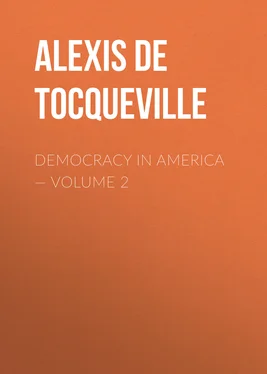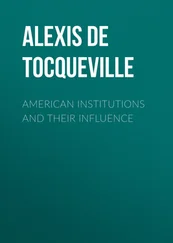Alexis de Tocqueville - Democracy in America — Volume 2
Здесь есть возможность читать онлайн «Alexis de Tocqueville - Democracy in America — Volume 2» — ознакомительный отрывок электронной книги совершенно бесплатно, а после прочтения отрывка купить полную версию. В некоторых случаях можно слушать аудио, скачать через торрент в формате fb2 и присутствует краткое содержание. Жанр: foreign_antique, Политика, foreign_edu, на английском языке. Описание произведения, (предисловие) а так же отзывы посетителей доступны на портале библиотеки ЛибКат.
- Название:Democracy in America — Volume 2
- Автор:
- Жанр:
- Год:неизвестен
- ISBN:нет данных
- Рейтинг книги:4 / 5. Голосов: 1
-
Избранное:Добавить в избранное
- Отзывы:
-
Ваша оценка:
- 80
- 1
- 2
- 3
- 4
- 5
Democracy in America — Volume 2: краткое содержание, описание и аннотация
Предлагаем к чтению аннотацию, описание, краткое содержание или предисловие (зависит от того, что написал сам автор книги «Democracy in America — Volume 2»). Если вы не нашли необходимую информацию о книге — напишите в комментариях, мы постараемся отыскать её.
Democracy in America — Volume 2 — читать онлайн ознакомительный отрывок
Ниже представлен текст книги, разбитый по страницам. Система сохранения места последней прочитанной страницы, позволяет с удобством читать онлайн бесплатно книгу «Democracy in America — Volume 2», без необходимости каждый раз заново искать на чём Вы остановились. Поставьте закладку, и сможете в любой момент перейти на страницу, на которой закончили чтение.
Интервал:
Закладка:
This is then the subject on which it is most important for each of us to entertain fixed ideas; and unhappily it is also the subject on which it is most difficult for each of us, left to himself, to settle his opinions by the sole force of his reason. None but minds singularly free from the ordinary anxieties of life—minds at once penetrating, subtle, and trained by thinking—can even with the assistance of much time and care, sound the depth of these most necessary truths. And, indeed, we see that these philosophers are themselves almost always enshrouded in uncertainties; that at every step the natural light which illuminates their path grows dimmer and less secure; and that, in spite of all their efforts, they have as yet only discovered a small number of conflicting notions, on which the mind of man has been tossed about for thousands of years, without either laying a firmer grasp on truth, or finding novelty even in its errors. Studies of this nature are far above the average capacity of men; and even if the majority of mankind were capable of such pursuits, it is evident that leisure to cultivate them would still be wanting. Fixed ideas of God and human nature are indispensable to the daily practice of men's lives; but the practice of their lives prevents them from acquiring such ideas.
The difficulty appears to me to be without a parallel. Amongst the sciences there are some which are useful to the mass of mankind, and which are within its reach; others can only be approached by the few, and are not cultivated by the many, who require nothing beyond their more remote applications: but the daily practice of the science I speak of is indispensable to all, although the study of it is inaccessible to the far greater number.
General ideas respecting God and human nature are therefore the ideas above all others which it is most suitable to withdraw from the habitual action of private judgment, and in which there is most to gain and least to lose by recognizing a principle of authority. The first object and one of the principal advantages of religions, is to furnish to each of these fundamental questions a solution which is at once clear, precise, intelligible to the mass of mankind, and lasting. There are religions which are very false and very absurd; but it may be affirmed, that any religion which remains within the circle I have just traced, without aspiring to go beyond it (as many religions have attempted to do, for the purpose of enclosing on every side the free progress of the human mind), imposes a salutary restraint on the intellect; and it must be admitted that, if it do not save men in another world, such religion is at least very conducive to their happiness and their greatness in this. This is more especially true of men living in free countries. When the religion of a people is destroyed, doubt gets hold of the highest portions of the intellect, and half paralyzes all the rest of its powers. Every man accustoms himself to entertain none but confused and changing notions on the subjects most interesting to his fellow-creatures and himself. His opinions are ill-defended and easily abandoned: and, despairing of ever resolving by himself the hardest problems of the destiny of man, he ignobly submits to think no more about them. Such a condition cannot but enervate the soul, relax the springs of the will, and prepare a people for servitude. Nor does it only happen, in such a case, that they allow their freedom to be wrested from them; they frequently themselves surrender it. When there is no longer any principle of authority in religion any more than in politics, men are speedily frightened at the aspect of this unbounded independence. The constant agitation of all surrounding things alarms and exhausts them. As everything is at sea in the sphere of the intellect, they determine at least that the mechanism of society should be firm and fixed; and as they cannot resume their ancient belief, they assume a master.
For my own part, I doubt whether man can ever support at the same time complete religious independence and entire public freedom. And I am inclined to think, that if faith be wanting in him, he must serve; and if he be free, he must believe.
Perhaps, however, this great utility of religions is still more obvious amongst nations where equality of conditions prevails than amongst others. It must be acknowledged that equality, which brings great benefits into the world, nevertheless suggests to men (as will be shown hereafter) some very dangerous propensities. It tends to isolate them from each other, to concentrate every man's attention upon himself; and it lays open the soul to an inordinate love of material gratification. The greatest advantage of religion is to inspire diametrically contrary principles. There is no religion which does not place the object of man's desires above and beyond the treasures of earth, and which does not naturally raise his soul to regions far above those of the senses. Nor is there any which does not impose on man some sort of duties to his kind, and thus draws him at times from the contemplation of himself. This occurs in religions the most false and dangerous. Religious nations are therefore naturally strong on the very point on which democratic nations are weak; which shows of what importance it is for men to preserve their religion as their conditions become more equal.
I have neither the right nor the intention of examining the supernatural means which God employs to infuse religious belief into the heart of man. I am at this moment considering religions in a purely human point of view: my object is to inquire by what means they may most easily retain their sway in the democratic ages upon which we are entering. It has been shown that, at times of general cultivation and equality, the human mind does not consent to adopt dogmatical opinions without reluctance, and feels their necessity acutely in spiritual matters only. This proves, in the first place, that at such times religions ought, more cautiously than at any other, to confine themselves within their own precincts; for in seeking to extend their power beyond religious matters, they incur a risk of not being believed at all. The circle within which they seek to bound the human intellect ought therefore to be carefully traced, and beyond its verge the mind should be left in entire freedom to its own guidance. Mahommed professed to derive from Heaven, and he has inserted in the Koran, not only a body of religious doctrines, but political maxims, civil and criminal laws, and theories of science. The gospel, on the contrary, only speaks of the general relations of men to God and to each other—beyond which it inculcates and imposes no point of faith. This alone, besides a thousand other reasons, would suffice to prove that the former of these religions will never long predominate in a cultivated and democratic age, whilst the latter is destined to retain its sway at these as at all other periods.
But in continuation of this branch of the subject, I find that in order for religions to maintain their authority, humanly speaking, in democratic ages, they must not only confine themselves strictly within the circle of spiritual matters: their power also depends very much on the nature of the belief they inculcate, on the external forms they assume, and on the obligations they impose. The preceding observation, that equality leads men to very general and very extensive notions, is principally to be understood as applied to the question of religion. Men living in a similar and equal condition in the world readily conceive the idea of the one God, governing every man by the same laws, and granting to every man future happiness on the same conditions. The idea of the unity of mankind constantly leads them back to the idea of the unity of the Creator; whilst, on the contrary, in a state of society where men are broken up into very unequal ranks, they are apt to devise as many deities as there are nations, castes, classes, or families, and to trace a thousand private roads to heaven.
Читать дальшеИнтервал:
Закладка:
Похожие книги на «Democracy in America — Volume 2»
Представляем Вашему вниманию похожие книги на «Democracy in America — Volume 2» списком для выбора. Мы отобрали схожую по названию и смыслу литературу в надежде предоставить читателям больше вариантов отыскать новые, интересные, ещё непрочитанные произведения.
Обсуждение, отзывы о книге «Democracy in America — Volume 2» и просто собственные мнения читателей. Оставьте ваши комментарии, напишите, что Вы думаете о произведении, его смысле или главных героях. Укажите что конкретно понравилось, а что нет, и почему Вы так считаете.












